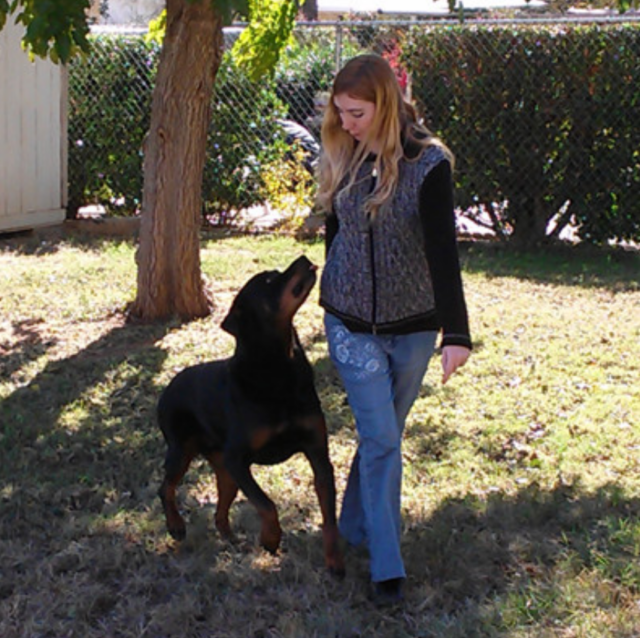DogsU is reader-supported. When you buy via links on our site, we earn an affiliate commission at no extra cost to you.
Numerous pet owners are gravitating towards virtual dog training sessions instead of face-to-face meetings. Each training method has its merits, yet dogs vary in their learning preferences for mastering new skills and behaviors.
While all dogs gain from training, not every canine thrives in conventional class settings. Certain dogs find it challenging to remain attentive amidst peers, while some may need instruction on specific issues rather than broad obedience training. Consequently, online dog training emerges as an excellent option for meeting the diverse needs of different dogs.
With the rising popularity of online training, there’s an abundance of platforms available. We have curated a selection of top online dog training courses to assist in choosing the most appropriate one for your dog’s unique requirements.

Why Opt for Online Dog Training Courses?
Online dog training stands as an excellent alternative for pet owners who find it challenging to commit to onsite classes due to time constraints or lack of energy. Here are several reasons why online training is a popular choice among dog owners:
- Flexibility: It fits easily into a hectic schedule.
- Convenience: Allows training to begin in an environment where your dog feels most at ease.
- Reduced Distractions: Minimizes external distractions for your dog.
- Suitable for Sensitive Dogs: Ideal for dogs that are easily stressed or overwhelmed.
- Personalized Attention: Courses often offer individual sessions rather than group settings.
- Customizable Learning: Enables focus on specific training areas of interest or need.
- Replayability: Provides the option to revisit training videos multiple times.
- Cost-Effectiveness: Generally more budget-friendly compared to traditional training.
While each dog training service is unique, these advantages are commonly found across many platforms, eliminating the necessity for physical attendance to achieve effective dog training.
Dog University’s Picks for “Best Online Dog Training Courses”
1. K9 Training Institute Online Dog Training
K9 Training Institute vows to train your dog to behave by using the same techniques used to keep service dogs so calm and well-behaved. Most of this company’s training focuses on body language instead of verbal commands. These methods can work for all dogs regardless of their age or breed.
This company’s online training starts with a free workshop that covers topics like barking, chewing, potty training, nipping, leash pulling, and ignoring commands. Once you complete the free training workshop, you can choose to purchase more online classes to further your furry friend’s learning. After all, training is something that should continue throughout your dog’s life, not just for one class.
The trainers at this company are especially passionate about helping train rescue dogs to give them better chances at success in their new homes.
Related: K9 Training Institute Online Dog Training Review
2. SpiritDog Online Dog Training
SpiritDog Training offers online dog training courses for canines of all ages, breeds, behaviors, and training levels. The dog trainers at this company have created videos to walk dog parents through each course, and you can rewatch videos as many times as needed. Every person who signs up for SpiritDog gets unlimited feedback from professional trainers for life. So, if you get stuck while watching a video, you can ask a trainer as many questions as you’d like.
You can choose from individual courses, or you can purchase bundles to save money. Here are some of SpiritDog’s most popular bundles:
SpiritDog courses always focus on positive reinforcement training to make training an uplifting, productive experience for dogs and set them up for success. These classes differ from in-person training because they allow you to train your dog at your own pace in an environment that’s comfortable for them.
3. Kingdom of Pets Online Dog Training
Kingdom of Pets offers several books dedicated to dog training. Yet, many pet parents benefit more from seeing dog training in action rather than just reading about it. Thus, the company also has many online training videos for purchase, covering areas like leash walking, barking, chewing, and aggression.
Once you purchase a training package, you get lifetime access to that content. All courses from Kingdom of Pets aim to create positive experiences for dogs, and they teach customers how to effectively use reward-based training in a way that’s beneficial for both you and your canine companion. The trainers at Kingdom of Pets want to ensure that their training resources are effective for pet parents, so if you don’t find success within the first 60 days of training, you can get a refund with no questions asked.
However, this company allows you to try a free 6-day course before paying anything to ensure that this is the right training company for you. The free course offers information about dog and cat training, pet health needs, and animal behaviors.
4. Brain Training for Dogs
The professional trainer who runs Brain Training for Dogs spent ten years perfecting her training methods. Thus, her online training classes are in-depth and designed to tackle any behavioral issue in dogs, no matter how complicated the issues may seem. The training focuses on a dog’s mental stimulation to enhance their intelligence and learning capabilities. The courses will also help dog parents get to the root of the problem instead of only fixing it on a surface level.
Some of the many issues these training courses focus on include potty training, jumping, digging, excessive barking, and ignoring commands. The course videos get right to the point so you don’t have to waste any time. The trainer approaches each problem behavior by finding a way for the dog to understand what they’re supposed to be doing.
Once you order the bundle of all these classes, the trainer will offer you support along the way whenever you need it. The first 60 days of the program is a trial period, so if you don’t find success with the training practices, you can get your money back. That’s how important your dog’s success is to this company.
5. Dunbar Academy Dog Training Online
Like K9 Training Institute, Dunbar Academy offers a Free Course Collection for dog parents that aren’t sure if online training is right for them. They offer several free courses, such as “Guide to Getting a Puppy or Dog,” “Six Simple Steps to Solve Your Dog’s Behavior Problems,” and “Dog Shelter Behavior & Training Program.”
If you like the way the free courses work, you can get more in-depth courses through a monthly or yearly fee. With the subscription, you can access hundreds of hours of content to help your dog succeed. That content includes videos, ebooks, podcasts, worksheets, and webinars, so there are methods that appeal to every person. You’ll also get access to a Facebook group where you can get training advice from dog trainers and other members.
You can also purchase individual bundles instead of a subscription if you only want to focus on certain training areas. Some popular bundles include Puppy Training, Behavior Problems, and a Games Workshop. The trainers at this company focus on games and reward-based training to get positive results.
6. Holly and Hugo Online Dog Training
Holly and Hugo not only offers a variety of training courses, but they also have videos about animal behavior and care. With the help of pet experts and experienced teachers, you can access a variety of videos and content to improve your pet’s life. The courses cover topics like training, animal psychology, pet sitting, and grooming.
Customers can purchase courses individually or pay a discounted price to get access to all the courses. At the end, you get a certificate of completion. Some of the courses even qualify for CE and CPD points for dog lovers looking to pursue a career in the animal industry.
This training option is great for dog parents who like to work on a schedule because once you activate a course, you have 60 days to complete it (unless you choose to extend it). With a time limit in place, it can help keep you motivated to train regularly so your dog can succeed. The trainers at Holly and Hugo love dogs as much as you, so they set up these courses to provide the best support for your furry friend.
7. The One Kind of Online Dog Training We Recommend Avoiding
The debate over shock collar use in dog training is highly polarized. Proponents claim that shock collars provide a rapid fix for behavioral issues, yet this approach often ignores the possible psychological and physical damage inflicted on dogs. Consequently, we strongly oppose the use of shock collars in dog training for several significant reasons.
Primarily, shock collars rely on punitive measures, a strategy increasingly invalidated by animal behavior experts and veterinarians. The negative repercussions of punishment-centric training can include heightened fear, anxiety, and even aggression in dogs. An unexpected shock can instill fear not just regarding the specific behavior it was meant to deter but also about the setting in which it occurred, potentially leading to a widespread anxiety and confusion in the dog.
Moreover, shock collars do not tackle the underlying cause of behavioral issues. Instead of educating the dog on desired behaviors, they merely suppress symptoms of deeper problems. For instance, a shock collar might temporarily stop a dog from barking due to separation anxiety without addressing the root cause of the anxiety itself. In contrast, more compassionate and positive training techniques aim to understand and resolve the foundational issues, fostering a happier and more obedient dog.
Finally, the use of shock collars can erode the vital bond between a pet and its owner. A relationship built on trust and reciprocal respect is crucial for a strong human-animal bond. Employing a shock collar can lead a dog to associate its owner with discomfort and fear, severely damaging this relationship. Thus, we strongly advise against selecting an online dog training course that advocates the use of shock collars.

What To Look for in the Best Online Dog Training Classes
To decide which option is best for your canine companion, you should consider the following aspects.
Training Methods
Not all dog trainers have the same values, so it’s important to find one that aligns with yours. For most dog lovers, positive reinforcement is the best training method because it’s effective while also being fun for your dog. Thus, you should make sure the trainer you choose also values rewarding good behavior instead of focusing on punishments or fear-based training.
Classes Offered
If there’s a specific area of training that you’d like to focus on, make sure that type of class is offered. Most online training courses have basic obedience classes, but they might not all cover specific areas like reactivity or agility.
Communication
Just because a class isn’t in person doesn’t mean the communication should be worse. Before purchasing a course, check to make sure there’s an easy way to reach out to a trainer with any questions or concerns you may have.
Cost
Cost is always a big consideration for dog parents. Dog training classes aren’t cheap, but online options may be more affordable. If you’re on a budget, you may need to narrow down your options to the ones that fit in your price range.

Frequently Asked Questions About Online Dog Training Courses
1. What are the benefits of online dog training courses?
Online dog training courses offer a flexible and convenient way for pet owners to train their dogs from the comfort of their own homes. These courses are beneficial for individuals with busy schedules, as they can access the training material at any time that suits them. Additionally, online courses often cover a wide range of topics, from basic obedience training to addressing specific behavioral issues, making them suitable for dogs of all ages and breeds.
The use of videos and interactive content in online training also allows owners to see techniques in action and apply them more effectively. Furthermore, online courses can provide access to expert trainers and communities of fellow dog owners, offering support and advice that might not be available locally. This method of training can be particularly useful for dogs who are not comfortable in group settings or for owners who prefer a more personalized training approach. However, it’s important for owners to remain consistent and dedicated to the training process for the best results.
2. How do I choose the best online dog training course?
Choosing the best online dog training course involves several considerations to ensure it meets both your and your dog’s needs. Firstly, identify your training goals, such as whether you’re seeking basic obedience training, behavior modification, or skill development. Research courses that specialize in these areas and check their curriculum to ensure it covers the topics you’re interested in. Look for courses taught by certified professional dog trainers with a positive reputation in the field. Reading reviews and testimonials from previous participants can provide valuable insights into the effectiveness of the course. Additionally, consider the format of the course (video lessons, live sessions, interactive content) and determine what would best suit your learning style and schedule.
The flexibility of access, such as the ability to rewatch sessions, can also be a crucial factor. Cost is another important consideration; however, the most expensive course is not necessarily the best. Many high-quality, affordable options are available, so look for one that offers good value for money. Lastly, check if the course offers support or follow-up consultations with the trainer, as ongoing support can be beneficial for addressing any future training challenges.
3. Can online dog training courses replace in-person training?
Online dog training courses can be highly effective and, in many cases, can replace in-person training, especially for basic obedience and specific behavioral issues. They offer the convenience of learning at your own pace and in an environment where your dog may feel more comfortable and less distracted. However, whether an online course can fully replace in-person training depends on several factors, including the dog’s behavior, the owner’s experience, and the complexity of the training goals. For dogs with severe behavioral issues or for owners who prefer hands-on guidance and immediate feedback, in-person training may be more beneficial.
Additionally, socialization aspects, such as interacting with other dogs and people, are better addressed in group training sessions. Nevertheless, many online courses offer interactive components, such as live Q&A sessions or personalized feedback from trainers, which can significantly enhance the learning experience. For owners committed to applying the lessons learned online and who are consistent with training, online courses can be an effective alternative or supplement to traditional in-person training.
4. What should I expect from an online dog training course?
When enrolling in an online dog training course, you can expect a structured program designed to teach you and your dog various commands and behaviors. Courses typically start with foundational skills, such as sit, stay, come, and gradually progress to more advanced techniques and behaviors. Expect a mix of video lessons, written materials, and possibly live webinars or interactive sessions. These resources are designed to demonstrate training techniques clearly and provide guidance on applying them with your dog. Most courses also include assignments or practice exercises for you and your dog to complete, helping reinforce the lessons learned.
Depending on the course, you may have access to a community forum or direct communication with the trainer for personalized advice and support. It’s important to commit time and effort consistently, as regular practice is key to successful training. Also, be prepared for a learning curve; patience and persistence are essential, as different dogs learn at different paces. Lastly, expect to develop a deeper understanding of dog behavior and how to effectively communicate with your pet, enhancing your bond and improving their behavior.
5. How long does it take to see results from an online dog training course?
The time it takes to see results from an online dog training course can vary widely depending on several factors, including the dog’s age, breed, temperament, and previous training experience. Additionally, the complexity of the training goals and the consistency and quality of the training sessions also play significant roles. Basic obedience commands, such as sit, stay, and come, can often show improvements within a few weeks of consistent training. More complex behaviors or addressing specific behavioral issues may take several months to improve.
It’s important for owners to remain patient and consistent, applying the training techniques regularly and providing positive reinforcement to encourage good behavior. Regular practice and repetition are key to reinforcing the lessons learned. Also, adjusting strategies based on the dog’s response to training can help achieve better results. Remember, training is a progressive process, and ongoing reinforcement is essential to maintain and build upon the initial successes.
6. Are online dog training courses suitable for all breeds and ages?
Online dog training courses are designed to be flexible and adaptable, making them suitable for dogs of all breeds and ages. Whether you have a puppy, an adult dog, or a senior pet, online training can provide valuable skills and behavior modification techniques. For puppies, many courses focus on basic obedience, socialization, and early problem-solving strategies. Adult dogs can benefit from courses aimed at refining obedience skills, addressing behavioral issues, or learning new tricks and activities. Even senior dogs can enjoy and benefit from training that is tailored to their physical capabilities and cognitive needs. However, it’s important to choose a course that matches your dog’s learning stage and physical condition.
The adaptability of online training allows owners to progress at a pace that suits their dog’s individual needs, making it a versatile option for a wide range of dogs. Always ensure that the training methods used are positive and reward-based, promoting a healthy learning environment for your pet.
7. How interactive are online dog training courses?
The level of interaction in online dog training courses can vary significantly from one program to another. Some courses offer highly interactive elements, including live webinars or classes where participants can ask questions in real-time, submit videos of their training sessions for feedback, or access one-on-one consultations with trainers. Other courses may primarily consist of pre-recorded videos and written materials, with limited opportunities for direct interaction. However, many of these courses provide forums or community groups where students can share experiences, ask questions, and support each other. The most interactive courses often combine various elements, offering a comprehensive learning experience that allows for personal feedback and support. When choosing an online dog training course, consider how much interaction you desire and how beneficial direct feedback will be for your training goals. If you value personalized guidance or have specific concerns about your dog’s behavior, look for courses that offer a higher level of interaction with trainers and fellow participants.
8. What kind of support can I expect from an online dog training course?
Support offered by online dog training courses can range from email and forum access to personalized feedback and live Q&A sessions with trainers. Many courses provide a community platform where students can share experiences, ask questions, and receive advice from both peers and trainers. Some courses also offer the ability to submit videos of your training sessions for review, receiving tailored advice and corrections. Additionally, comprehensive courses might include one-on-one virtual consultations with a trainer to address specific challenges or goals. The level of support can greatly enhance the learning experience, providing motivation and clarification when needed. It’s important to choose a course that offers the type and level of support you feel will be most beneficial for your training journey. Remember, the more interactive the course, the more likely you are to receive personalized advice that can directly impact your success with the training.
9. Can online dog training help with behavioral issues?
Yes, online dog training can be highly effective in addressing a variety of behavioral issues, from basic obedience problems to more complex challenges like aggression, anxiety, and excessive barking. Many online courses are designed specifically to tackle behavioral issues, offering step-by-step guidance on how to understand the root causes of undesirable behaviors and how to implement effective solutions. These courses often provide strategies for modifying behavior using positive reinforcement techniques, setting boundaries, and building a stronger bond between you and your dog. However, it’s important to choose a course that targets your specific concerns and to be realistic about the process; some behavioral issues may require patience, consistency, and possibly even the involvement of a professional dog behaviorist for more severe cases. Online training can offer a solid foundation and valuable tools, but success also depends on the owner’s commitment to applying the techniques learned and maintaining consistency in training.
10. What are the limitations of online dog training courses?
While online dog training courses offer convenience and flexibility, there are some limitations to consider. One key limitation is the lack of direct, in-person interaction with a trainer, which can make it challenging to receive immediate feedback and corrections specific to your dog’s behavior. This can be particularly impactful for complex behavioral issues or when fine-tuning advanced training techniques. Another limitation is the requirement for self-motivation and discipline; without the structure of scheduled classes, it’s up to the owner to consistently apply the training principles and exercises. Additionally, online training may not provide the socialization experiences with other dogs and people that in-person classes can, which are important for developing well-rounded, sociable pets. Finally, the effectiveness of online training also heavily depends on the quality of the course content and the suitability of the training methods for your dog’s individual needs and temperament. Despite these limitations, many dog owners find online training a valuable and effective tool, especially when supplemented with other forms of training and socialization.







